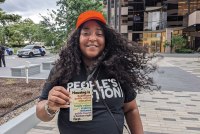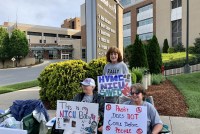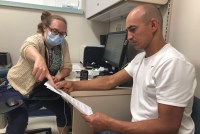Latest KFF Health News Stories
Woman Petitions Health Insurer After Company Approves — Then Rejects — Her Infusions
Even people with good insurance aren’t guaranteed affordable care, as this KFF Health News follow-up to one patient’s saga shows.
Cancer Patients Face Frightening Delays in Treatment Approvals
Delaying cancer treatment can be deadly — which makes the roadblock-riddled process that health insurers use to approve or deny care particularly daunting for oncology patients.
‘They See a Cash Cow’: Corporations Could Consume $50 Billion of Opioid Settlements
As opioid settlement dollars land in government coffers, a swarm of businesses are positioning themselves to profit from the windfall. But will their potential gains come at the expense of the settlements’ intended purpose — to remediate the effects of the opioid epidemic?
Dodging the Medicare Enrollment Deadline Can Be Costly
As open enrollment ends, many people are tuning out. They could wind up with a surprise next year: higher costs and less access to health care providers.
Facing Financial Ruin as Costs Soar for Elder Care
The United States has no coherent system of long-term care, leading many to struggle to stay independent or rely on a patchwork of solutions.
Underdiagnosed and Undertreated, Young Black Males With ADHD Get Left Behind
A recent study found that young Black males are substantially more likely to be underdiagnosed and undertreated for the neurological condition than white peers.
Gubernatorial Candidates Quarrel Over Glory for Winning Opioid Settlements
Some gubernatorial candidates are sparring over bragging rights for their state’s share of $50 billion in opioid settlement funds. Many of the candidates are attorneys general who pursued the lawsuits that produced the payouts.
When That Supposedly Free Annual Physical Generates a Bill
Completing a routine depression screening questionnaire during an annual checkup is cost-free under federal law. But, as one woman discovered, answering a doctor’s follow-up questions might not be.
Storing Guns Away From Home Could Reduce Suicides, but Legal Hurdles Loom
Safe storage maps show gun owners where to put their firearms for safekeeping if they experience a mental health crisis. The idea has support among some gun enthusiasts, but legal obstacles threaten wider adoption.
Quick Genetic Test Offers Hope for Sick, Undiagnosed Kids. But Few Insurers Offer to Pay.
A new, rapid genetic test shows promise in increasing diagnoses and improving treatment for some children with rare genetic conditions. Many insurers won’t cover it, but Florida’s Medicaid program is among those that see benefits — and, potentially, savings.
Pruebas genéticas rápidas a bebés pueden salvar vidas, pero muchas aseguradoras no las cubren
Que Medicaid cubra la prueba puede expandir significativamente el acceso para los bebés; el programa de salud federal gerenciado por los estados que asegura a las familias de bajos ingresos y que cubre a más del 40% de los niños en su primer año de vida.
Covid Relief Payments Triggered Feds to Demand Money Back From Social Security Recipients
Some Social Security beneficiaries say the government is clawing back benefits after they received covid stimulus payments that were supposed to be exempt from asset limits.
Rare ‘Flesh-Eating’ Bacterium Spreads North as Oceans Warm
A rise in cases of Vibrio vulnificus and its spread northward have heightened concern about the bacterium, which can cause human tissue to rot and skin to decay. The Centers for Disease Control and Prevention is trying to make more doctors aware of the dangerous pathogen.
These Appalachia Hospitals Made Big Promises to Gain a Monopoly. They’re Failing to Deliver.
Ballad Health, the only hospital system across a large swath of Tennessee and Virginia, has fallen short of quality-of-care and charity care obligations — even as it’s sued thousands of patients for unpaid bills.
Social Security Overpayments Draw Scrutiny and Outrage From Members of Congress
Lawmakers are faulting the Social Security Administration for issuing billions of dollars of payments that beneficiaries weren’t entitled to receive — and then demanding the money back — in the wake of an investigation by KFF Health News and Cox Media Group.
Officials Agree: Use Settlement Funds to Curb Youth Addiction. But the ‘How’ Gets Hairy.
Parents, educators, and elected officials agree that investing in school-based prevention efforts could help curb the rising rate of youth drug overdoses. The well-known D.A.R.E. program is one likely choice, but its effectiveness is in question.
Journalists Recap How Smallpox Was Wiped Out and How Opioid Settlement Cash Is Being Paid Out
KFF Health News and California Healthline staff made the rounds on national and local media this week to discuss their stories. Here’s a collection of their appearances.
No existen normas federales para proteger a los trabajadores cuando los días son excesivamente calurosos. Y sin el apoyo bipartidista del Congreso, incluso con la atención urgente de la administración Biden, es posible que el alivio no llegue en años.
Workers Pay the Price While Congress and Employers Debate Need for Heat Regulations
Studies suggest official numbers vastly underestimate heat-related injuries and illness on the job. To institute protections, the government must calculate their cost — and the cost of inaction.
When Temps Rise, So Do Medical Risks. Should Doctors and Nurses Talk More About Heat?
The medical dangers of heat are real. But people often ignore public heat alerts or don’t realize how vulnerable they are. A new alert system prompts clinicians to talk about heat with patients.
























